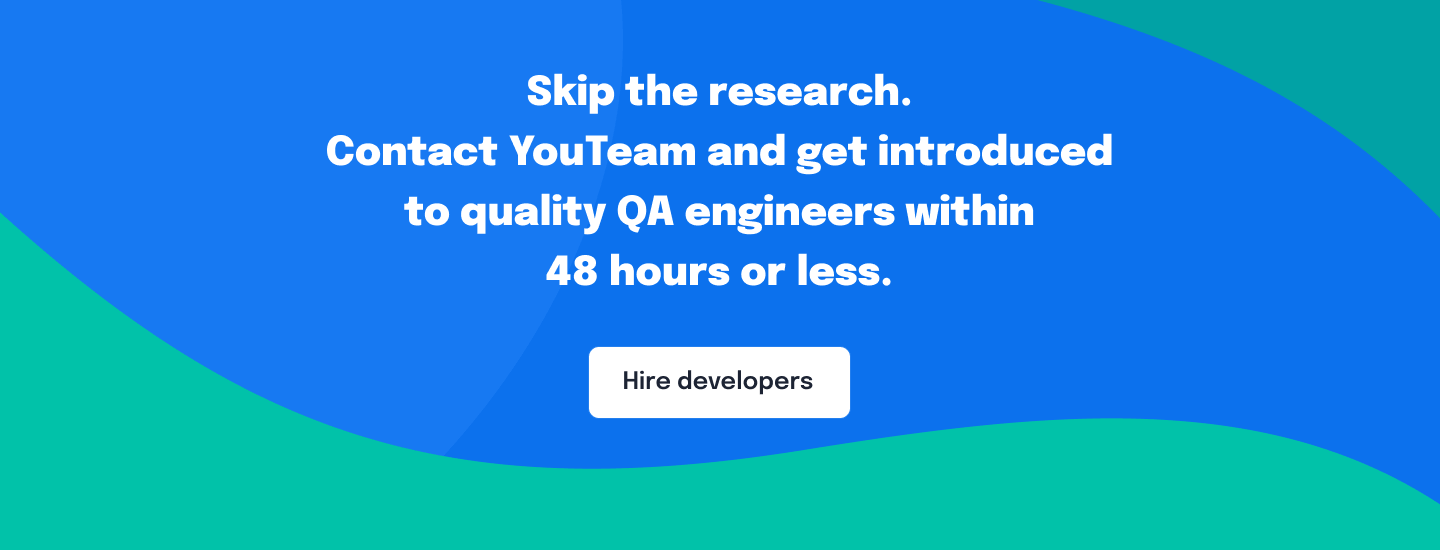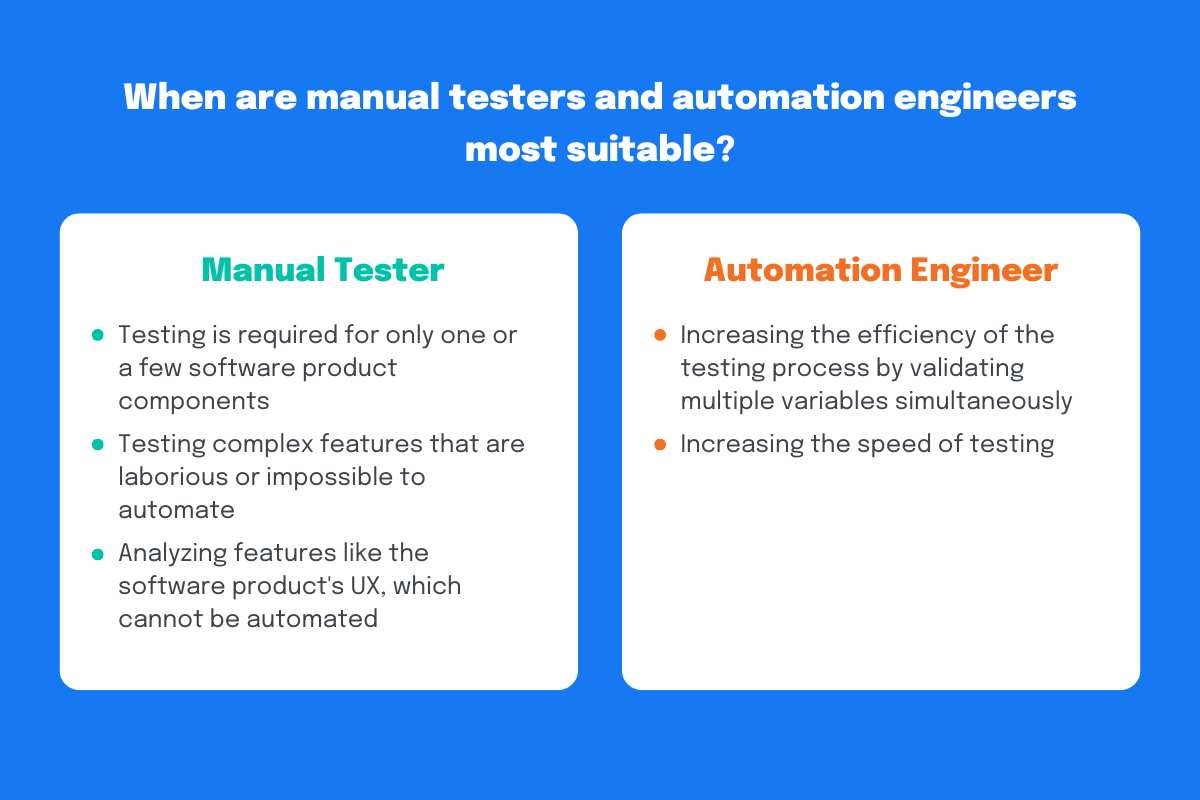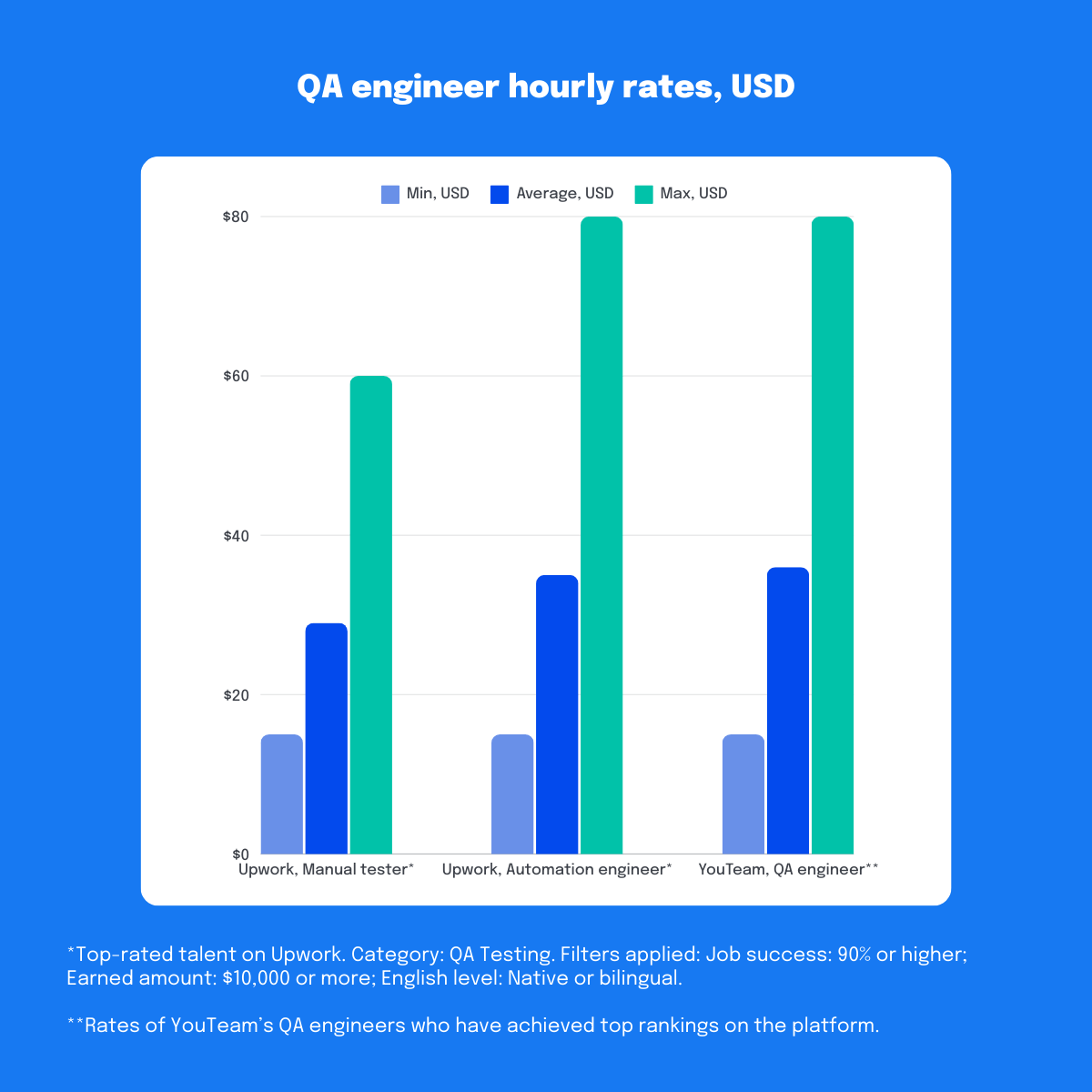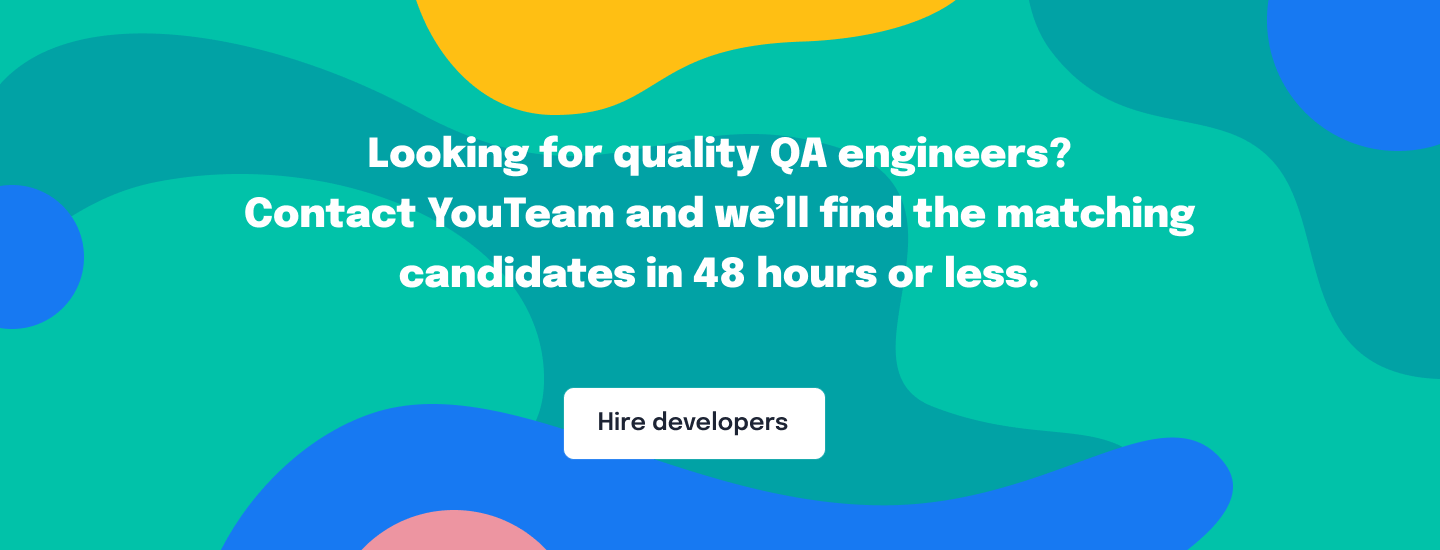Relying on a QA engineer during the software development process ensures the product’s security and usability. Products are now expected to be perfect upon the first launch, and any unforeseen error can greatly cost the company financially as well as affect the reliability of company products. As such, a QA engineer is responsible for verifying the integrity of the software product before reaching the end user.
Due to the increased demand for software developers and specialized quality assurance engineers, it is projected that the employment level in the US in this field will continue to grow by 25% through 2031. Such a tendency shows that the tech industry is expanding rapidly, which also influences the difficulty level of finding a potential employee, with more than 308,390 positions expected to be available by 2029.
In this article, we’ll discuss different hiring process models and provide advice on how to conduct interviews when searching for a QA engineer. Additionally, we will look at the salary range for QA engineers worldwide to make it easier to find a better QA.
Table of Contents
Importance of a QA engineer in software development
Quality assurance (QA) testers are responsible for software validation before it’s presented to customers. Software testing is essential to help prevent a poor user experience, which hinders a product’s success. Additionally, a low-quality product with software errors may lead to financial losses if they go undetected.
For example, poor software resulted in a catastrophe for Mt. Gox, a Japanese Bitcoin exchange whose system got hacked for a $460 million loss. Any programming glitches or vulnerabilities would have been discovered and rectified if they hadn’t compromised quality assurance. Performing the needed tests by QA experts could have prevented this disaster.
A QA engineer is responsible for drafting measurable metrics to validate the software product’s good quality. Some attributes with assigned metrics include functionality, reliability, portability, usability, and maintainability.
What are the requirements for a QA engineer?
The role of a QA engineer is to work with the software development team, providing insight into how the product should function and look to be usable and accepted by the customers. A QA engineer is responsible for testing the product after each set stage to ensure it satisfies all the requirements before proceeding to the next step. A QA engineer creates the testing scripts for the final project to test parameters such as accessibility, usability, and functionality.
Responsibilities of QA engineer
- Identifying the client’s needs and developing software testing methods to satisfy these requirements.
- Developing well-structured QA testing plans that are easy to implement and execute.
- Working together with all parties involved in product development to come up with better solutions.
- Designing and developing testing scripts for every stage of product software development.
- Developing quality-measuring metrics for every product development and lifecycle stage.
- Identifying and resolving any resulting bugs.
- Documenting any resulting bugs and operations not in line with how the software is supposed to operate.
- Ensuring that the software testing tools and strategies are up to date with the current requirements and are suited for a thorough test of the project under development.
- Developing a QA testing process, conducting functional testing, and retesting fixed defects.
Types of QA engineers: Manual QA engineer vs. Automation engineer
There are two different primary types of QA engineers—manual and automation. A manual QA engineer tests the software product by going over it step-by-step without the test scripts. They try to predict how end users will interact with the product and test if everything looks and works correctly. Manual QA engineers are often required at the beginning of the project when the details need to be checked manually.
An automation QA engineer develops a testing framework, which is used in conjunction with other tools to test software automatically. Essentially, an automation QA is required when the developers have completed coding the project and require someone to write the test scripts to check the code. Test scripts are essential as they enable simultaneous validation of different scenarios.
Below are some points to help you understand whom you need for a particular task or stage during the development of your product.
How to choose the best one?
A manual QA engineer is best when:
- Only one or a few software product components need to be tested.
- Testing complex features that are laborious or impossible to automate.
- Analyzing features, such as the software product’s UX, which cannot be automated.
An automation QA engineer is best when:
- You want to increase the efficiency of the testing process by validating multiple variables simultaneously.
- Testing needs to be performed quicker.
How to hire a QA engineer
The choice of hiring a software tester depends on several factors, such as:
- The complexity of the project under development;
- The company’s budget;
- The needs a QA engineer requires.
These conditions influence the company’s decision to hire from the following options: in-house specialists, outsourced QA engineers, full-time contractors, and freelancers. The following content describes the benefits of each option.
In-house team
Having full-time in-house QA engineers is one of the best solutions, especially when the software product is complex and has a long lifecycle. The in-house team members have a thorough knowledge of the product, and therefore, maintenance becomes easier. However, this hiring model can be expensive as these are salary employees. Other expenses include health insurance, paid vacations, and other employee benefits.
Outsourced specialists
If you decide to outsource your development process or just the quality assurance, you can look for a reliable software development agency and provide them with a detailed description of what you want. After that, your task is assigned to a team that suits your needs, and the work begins. This option provides a quick way to get started. However, most outsourcing agencies prefer to work with the entire project. So, it’s the most relevant solution if you want to outsource the entire development process. Sites such as Clutch and The Manifest are good places to look for reliable outsourcing agencies.
Full-time contractors
A full-time contractor is the best solution when you need specific specialists or a team of engineers for a certain period. The main advantage is getting the required quality tech talent within a week with YouTeam. They are of top quality, they work in software development agencies, and you can hire them with a staff augmentation model. This option is also a cost-effective solution as you avoid paying bonuses like for the in-house team, but you get dedicated engineers for your project.
Hire QA engineers with YouTeam
Freelancers
Freelancers work on a particular project for a fixed fee. Their services are cheaper than other hiring methods, but it’s the most unreliable way of hiring a specialist. Although hiring freelancers is easy, it can often become stressful. First, there is the issue of finding top-rate QA engineers, as almost everyone will pose themselves as an expert. Second, the engineer can disappear in the middle of a project, especially if they receive a better offer from another client. It can be a good solution for short-term tasks when you need additional power to complete projects—but it’s not always the best long-term solution.
Average salaries of QA engineers worldwide
The salaries of QA engineers depend on the type of project they are working on and the expected requirements. The QA engineer’s experience level—entry, middle, or senior—also influences their wages. Additionally, the salaries of QAs vary from country to country. Finally, it’s worth noting that testers with the same level of expertise can have different salary requirements depending on their location. For instance, hiring developers, especially in-house, is very expensive in the US or the UK. Therefore, clients from such locations often hire offshore. Below, we cover salaries for different countries to help with your hiring practices.
Average QA Engineer Salary in North and South America
According to Glassdoor, the average annual salary of a US QA engineer is approximately $94,000—the highest in the world. However, QA engineers in Latin American countries demand much lower salaries. For example, in Mexico, the average salary is $49,000, and in Brazil $41,000. These figures are lower as a result of lower costs of living. As such, Latin America is one of the most popular locations for outsourcing because development services of the same level as those in the US are much less expensive. Additionally, outsourcing from the US to Latin America is also more convenient because of similar time zones.
| Country | Junior QA engineer, $ | Middle QA engineer, $ | Senior QA engineer, $ |
| Mexico | $30,000 | $49,000 | $73,000 |
| Brazil | $33,000 | $41,000 | $75,000 |
| Costa Rica | $18,000 | $64,000 | $76,000 |
| Uruguay | $13,000 | $58,000 | $68,000 |
| Colombia | $14,000 | $28,000 | $41,000 |
Source: Glassdoor, Indeed, PayScale
Average QA Engineer Salary in Europe
Countries like the UK and Germany have higher salaries as compared to their European neighbors. In Germany, the average salary of a QA engineer is around $67,000, and in the UK, it’s $64,000—the highest in the region.
However, in the eastern region (Poland, Ukraine, and Bulgaria), where there are the most talented tech developers, the salaries are much lower. For example, the average salary of QA testers in Poland is around $37,000, and $24,000 in Ukraine. The lower costs of living are one of the main reasons for the lower salaries in this region.
| Country | Junior QA engineer, $ | Middle QA engineer, $ | Senior QA engineer, $ |
| The UK | $50,000 | $64,000 | $84,000 |
| Germany | $52,000 | $67,000 | $85,000 |
| Czech Republic | $52,000 | $59,000 | $91,000 |
| Poland | $21,000 | $37,000 | $71,000 |
| Ukraine | $21,000 | $24,000 | $46,000 |
| Hungary | $22,000 | $32,000 | $54,000 |
Source: Glassdoor, Indeed, PayScale
Average QA Engineers’ Salary in Africa and Asia
Experts in this region earn much lower salaries compared to the United States and Western Europe. For example, QA engineers in China average $25,000, while in India, the amount is much lower, with an average of $13,000. Conversely, the annual pay for QA engineers in South Africa is around $54,000.
| Country | Junior QA engineer, $ | Middle QA engineer, $ | Senior QA engineer, $ |
| India | $5,000 | $13,000 | $37,000 |
| China | $19,000 | $25,000 | $55,000 |
| Philippines | $6,000 | $15,000 | $23,000 |
| South Africa | $29,000 | $54,000 | $76,000 |
| Egypt | $5,000 | $13,000 | $34,000 |
| Kenya | $10,000 | $14,000 | $33,000 |
Source: Glassdoor, Indeed, PayScale
What are the hourly rates for a QA engineer?
We’ve compiled information on the average rates for QA engineers on the Upwork and YouTeam hiring platforms. Please note that YouTeam’s commission is up to 10% of the engineer’s hourly rate, while on Upwork, you’ll pay a flat 5% fee for fixed-price and hourly jobs.
Upwork QA Engineer hourly rates
| Min, USD | Average, USD | Max, USD | |
| Manual testing | $15 | $29 | $60 |
| Automation testing | $15 | $35 | $80 |
*Top-rated talent on Upwork. Category: Web, Mobile and Software developers. Subcategory: QA Testing. Filters applied: Job success: 90% or higher; Earned amount: $10,000 or more. English level: Native or bilingual.
YouTeam QA Engineer hourly rates
| Min, USD | Average, USD | Max, USD |
| $15 | $36 | $80 |
*According to YouTeam. Rates of QA engineers who have achieved top rankings on the platform.
| QA Engineer hourly rate, average, USD | |
| Middle QA engineer | $32 |
| Senior QA engineer | $42 |
| QA Lead | $48 |
*According to YouTeam. Rates of QA engineers who have achieved top rankings on the platform.
How to evaluate the skills of QA engineers?
When evaluating the skills of a QA engineer, you have to assess their hard and soft skills. It is essential to check their capability to work on your exact project. For example, mobile app development and e-commerce website development will require a QA with a different skill set.
A skill evaluation is especially important when planning to hire a remote developer. It is to find out how they will integrate and work with the team. Also, you need to check their organizational and self-management skills since remote work requires this. It’s a must for them to understand and be able to use GitHub and team communication apps like Slack, which makes software development easier when working remotely.
Below are some essential skills for a QA engineer.
Soft skills required for remote/in-house QA engineers
Effective communication. Communication skills are vital because they will be responsible for communicating with technical and non-technical people.
Effective teamwork. Product development requires teamwork, so being a team player facilitates the smooth development of software products. For instance, QA testers who possess this quality are patient and active listeners—not arrogant. Active listening allows one to understand other views (even if they disagree) and list why a particular solution is more effective. Also, effective teamwork makes it easier to identify pitfalls than when working alone.
In addition, they also need to be proactive. Developers analyze the product according to their tech requirements—they often cannot understand the client’s expectations and behavior. Therefore, QA engineers work best with the end-users in mind, and if the product fails to meet usability metrics, QAs should be able to provide this information and persuade developers to improve the product for a better user experience.
Critical thinking. Software under development must satisfy many requirements, including the client’s requirements and the user’s expectations. As such, a critical-thinking QA engineer can come up with solutions to ensure that solving technical requirements does not affect the user’s expectations. Also, critical thinking is essential in difficult situations as it enables a QA engineer to look at the issue from different angles and come up with efficient solutions.
Adaptability. Customer demands and expectations change frequently, and the industry-standard requirements must also get updated regularly. As such, an adaptable QA engineer can bring in relevant changes more promptly while ensuring that operations are not disrupted. The dynamic nature of the software industry requires someone who can adapt to new challenges.
Open-mindedness. For a software product to move to the next level, it should be unique and satisfy the needs of its end-users effectively. A QA should have a sharp eye for attention to detail. Meaning that they must look at the product from different angles and look for areas of improvement and possible issues. They should possess the ingenuity to invent new ways of using the product and improve testing methods to ensure that the end quality of the product exceeds the set standards.
QA engineer hard skills
The hard skills vary depending on the type of product software under development. For example, a QA engineer for Android app development should have a thorough knowledge of Java, user experience (UX), and other related technical skills for app development. Also, to qualify as a suitable QA engineer for a particular task, they should have extensive knowledge of the field and experience in creating and, for automation QAs, developing similar software. However, here are universal must-have skills for any tester:
- They have a thorough understanding and knowledge of different testing approaches. Also, they are up to date with the industry-standard methods and tools for product testing.
- A QA needs to be business-oriented to ensure that the test strategy used aligns with the project requirements. A QA engineer should understand the business objectives to carry out the testing process effectively.
- They know project management tools to ensure that the testing plan, coordination, and processes are performed effectively and within the required time frame.
For automation testing, a QA needs these extra skills:
- Proficiency in programming languages for coding scripts.
- Expertise in the use of current testing tools.
- To be well-versed in Agile and DevOps methodologies, which effectively use automated tests to ensure a high-quality product.
Skill assessment interview questions
An outstanding resume of a QA is good, but still, you need to assess their competence and other factors to ensure that you get the right person for the job. Skill assessment questions are one of the best ways to test and see if a QA is qualified enough for the project. Below are some example skills-assessment questions to ask during an interview.
– How do you approach work on a new project?
This question helps recruiters learn if the potential candidates are strategic enough to tackle a new project or issue. It also enables one to determine if they have a working methodology and testing strategy that will help with problem-solving and overall product development.
– How would you approach your test case design?
This question evaluates whether they can draft test cases to check all the software requirements thoroughly. It ensures that the end product operates as expected and has all the features the users want.
– How would you approach the work on a project if you don’t like recommendations or requirements?
This question is aimed at identifying soft skills of teamwork and conflict management, as opinions will vary during product development.
– Are you familiar with exploratory testing?
This checks the candidate’s creativity—whether they can think outside the box in a situation where a test case doesn’t cover everything. This question is essential when looking for manual QA engineers, as creativity and imagination are vital in performing manual tests of complex scenarios.
- Which QA tools do you use and why?
It measures their knowledge of testing tools and whether their tools of choice are preferred by your company. Also, their unique choice of tools can be more efficient compared to those that you are using, which can be an improvement.
How to manage remote QA engineers
As many companies move to a remote work model, engineering leaders are increasingly faced with questions about how to handle communication and cultural differences. Here are some tips to help you effectively manage remote QA engineers:
- Clearly define roles within the QA team.
- Describe your QA process for remote QA specialists.
- Communicate definitions of common concepts important to your project to ensure that your remote engineers are on the same page as your in-house team.
- Create a culture of frequent feedback to track progress and clarify misunderstandings.
- Trust your remote engineers and recognize their accomplishments.
Hiring QA engineers with YouTeam
At YouTeam, with more than 50,000 vetted developers and tech specialists, you are guaranteed to get the best-qualified engineers and QAs for your project. With us, finding a perfect candidate takes no more than 48 hours. The best thing about our system is that we perform additional vetting processes to ensure that the developers meet all your requirements and you get nothing short of quality. After they pass the rigorous YouTeam vetting steps, they can meet with the client.
We work with developers from Latin America and Eastern Europe, so our clients can choose the most convenient location.
Wrap up
The importance of QA testers in software product development has risen more than ever, and the demand for specialists is increasing. The need to develop high-quality software products is now the new normal as end users abandon inferior products. The role of a QA engineer is to come up with metrics to ensure that at the end of the testing stage, the product is worthy of use before deployment. While finding a good quality assurance engineer may be difficult, there are numerous solutions that a company can utilize to find one. Another option includes approaching YouTeam, which provides access to high-quality engineers and developers.
Also, knowing the range of QA engineers’ salaries can help you prepare in advance for the ideal candidate you are looking for. Lastly, you should test the skills of the potential candidates with evaluation questions to ensure they are the right people for the job.










